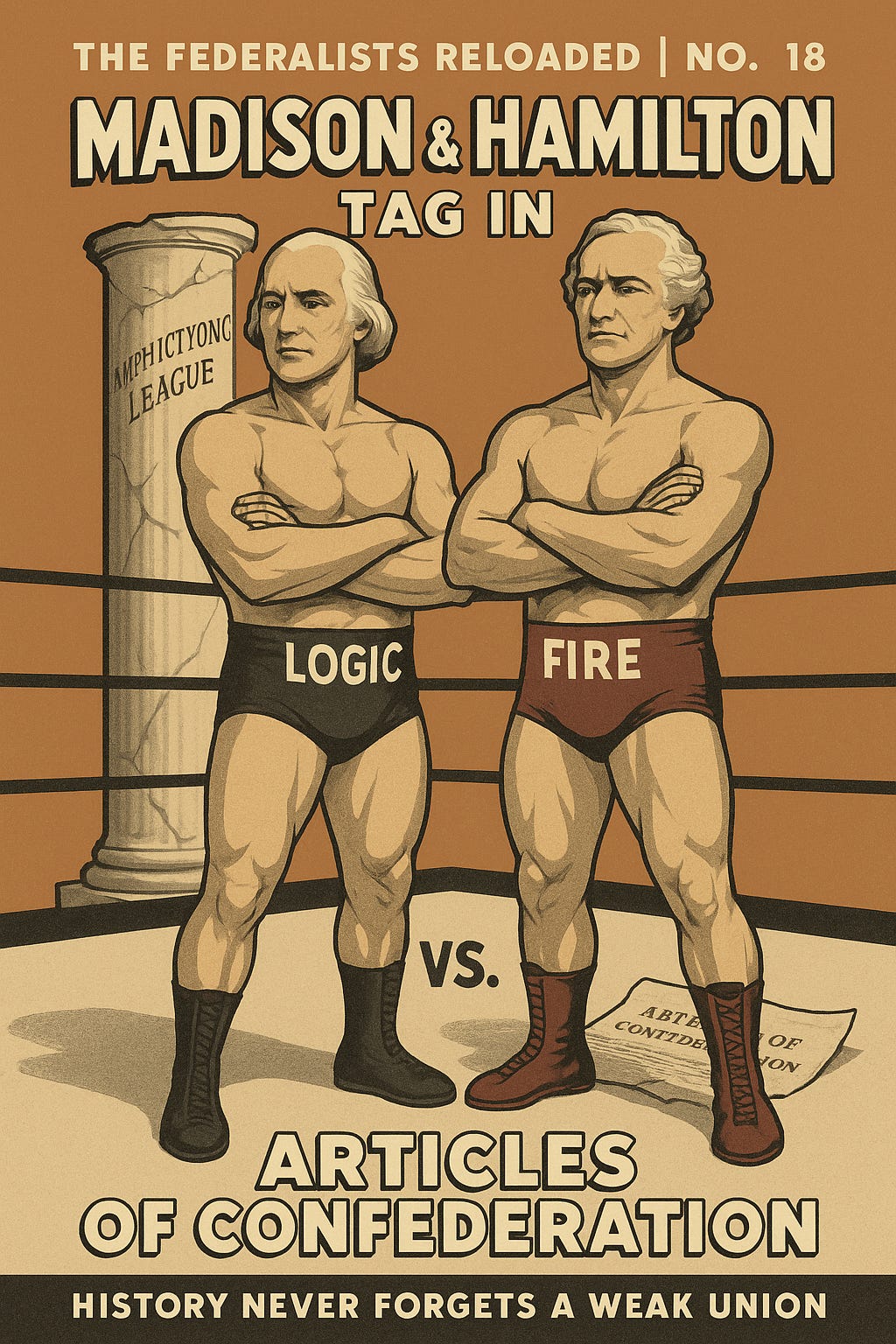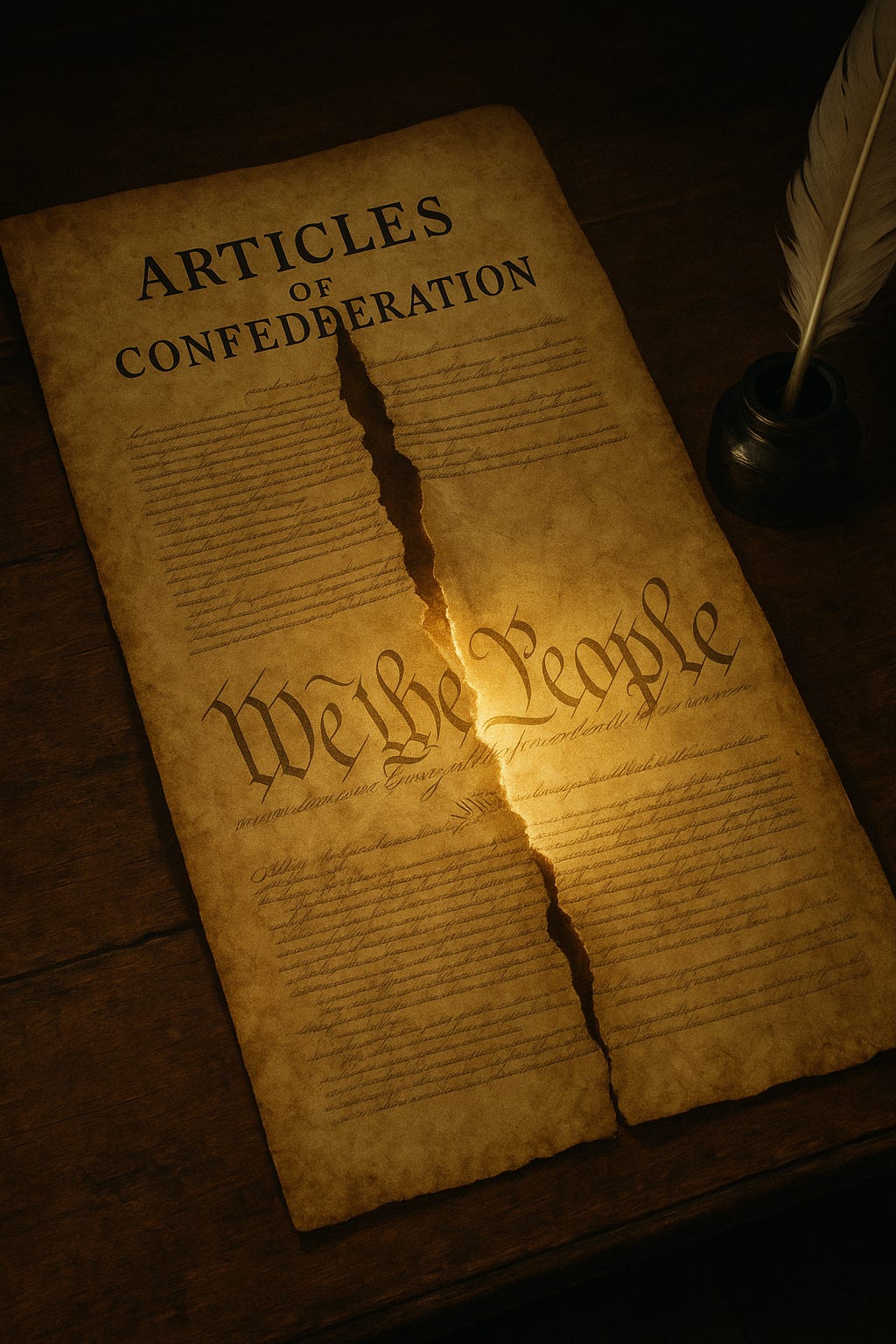The Federalists Reloaded | No. 18
A Historical Tag-Team Promo from Madison and Hamilton
Imagine the lights cutting through the smoke of a packed hall. Two figures step into the ring, each carrying the weight of a nation still figuring out what it wants to be. Madison, calm and precise, walks with the quiet confidence of a man who knows his history chapter and verse. Hamilton, restless and charged with energy, paces like he’s already halfway through the fight. And standing in the opposite corner, dazed and overmatched, is the Articles of Confederation, a well-meaning creation that was never built to survive the real world.
This isn’t politics as usual. It’s a tag-team promo on the biggest stage in American history. Madison and Hamilton aren’t trying to win applause; they’re trying to keep the whole thing from falling apart. Together, they’re cutting a speech that’s half history lesson, half intervention, warning the young republic that pride, paralysis, and self-interest are about to write its obituary. That’s the tone of Federalist 18.
Round One: History’s Highlight Reel
Madison grabs the mic first. He doesn’t need to shout; the tone alone quiets the room. He reminds the crowd that the idea of a confederation, of states united by choice rather than law, isn’t new. The Greeks attempted it centuries earlier with the Amphictyonic League, a loose alliance of city-states formed to protect temples and maintain peace. It looked noble on parchment. It collapsed in practice. The stronger states used the league to bully the weaker ones, turning unity into a weapon. Instead of binding Greece together, the league gave the ambitious an excuse to start wars in the name of cooperation.
And before anyone can catch their breath, Hamilton takes the tag. He’s not lecturing; he’s performing. He reminds everyone that the Greeks tried it again with the Achaean League, and for a while, it actually worked. They built councils, assemblies, and even shared governance. However, the same disease resurfaced: local pride, regional jealousy, and political vanity. Eventually, the stronger cities bent the rules, the smaller ones rebelled, and Rome showed up offering help. The Greeks took the offer, and that was the end of the story.
Madison nods, Hamilton leans into the ropes, and the message hangs in the air: two confederations, two failures, one lesson. Cooperation without structure always collapses.
Round Two: The American Re-Match
When they turn back to their own audience, it’s clear who they’re talking about. The Articles of Confederation were America’s Amphictyonic League, the same flawed experiment wrapped in different colors.
Hamilton doesn’t waste time. He calls out the system for what it is, a government that can’t govern. Congress has no power to tax, no power to enforce its laws, and no authority to raise an army without begging for it. Every state is running its own game, chasing its own interests, and calling it freedom. It’s thirteen little republics fighting for attention under one tired banner.
Madison steps in, quieter but sharper. He explains that what appears to be independence is, in reality, a slow death. Every time one state ignores another, every time Congress fails to act, every time local pride wins over national purpose, the union weakens. What the Revolution built in courage, disunity will undo in arrogance.
They don’t need to spell it out. The message lands hard: America is reenacting a literal Greek tragedy in real time.
Round Three: Pride Is the Real Opponent
Madison knows that pride destroys nations long before enemies arrive. Greece didn’t fall because it lacked soldiers or scholars. It fell because every city thought it could lead, and none could follow. Every alliance turned into an argument, and every argument into a grudge. Pride is the one enemy that no constitution can defeat on paper.
He looks around the room and sees the same thing. State leaders are calling themselves defenders of liberty while refusing to fund the government. Politicians claiming to guard freedom while making the country ungovernable. The revolution had made heroes out of rebels, and now everyone wanted to keep playing the part.
Hamilton doesn’t let it rest. He tells the audience that liberty without power is an illusion. A nation that cannot act is not free; it’s fragile. A government that depends on goodwill will collapse the moment goodwill runs out. Weakness is not moral purity; it’s an open invitation for chaos to take charge. He points at the Articles lying in the corner of the ring and says, “This isn’t freedom. It’s surrender.”
Round Four: The Tag Team Finds Its Rhythm
By now, they’re feeding off each other. Madison lays down the evidence, Hamilton turns it into impact. Madison brings the receipts, Hamilton delivers the punchlines. It’s half lecture, half sermon, and the audience can feel the rhythm of two minds working in sync.
Madison provides the history. He says that every confederation fails because human nature ensures that someone will prioritize their ego over order. Hamilton translates that into modern language: if no one’s in charge, the loudest voice takes over. Madison builds the logic, Hamilton sells the urgency. It’s like watching a chess player and a brawler fighting the same opponent from different angles.
Together, they’re not arguing for tyranny. They’re arguing for a government that can function before it falls. They don’t want to control the people; they want the people to stop drifting toward failure out of fear of authority.
Round Five: The Modern Re-Match
If you step back far enough, you can see the match playing out again. The stage looks different, the players wear suits instead of togas, but the moves are familiar.
States still view the federal government as a rival rather than a partner. Congress still uses dysfunction as a form of performance art. Politicians still claim that gridlock is proof of freedom. Every time one side wins, the other swears the system is broken. The cycle keeps spinning, and pride keeps winning the match.
Madison would see this and sigh. Hamilton would probably throw his notes and start shouting. The Amphictyonic League never really died; it simply evolved and started a social media presence.
And once again, the warning applies. A country that can’t agree on who leads eventually finds out that no one does.
Round Six: When Logic and Fire Unite
For a brief moment, Madison and Hamilton set aside their differences and worked together as one. Madison’s logic gave Hamilton credibility. Hamilton’s fire gave Madison reach. They spoke to both the head and the heart, building a case that the republic needed more than hope; it needed structure.
They didn’t argue for blind obedience. They argued for durability. They wanted to give liberty something solid to stand on. They wanted to keep America from becoming another forgotten chapter in the story of failed unions.
You can almost imagine them walking back to the corner between rounds, sweat on their brows, looking across the ring at the Articles and knowing they’ve already won the argument. The fight isn’t over, but the truth is landing.
Final Bell: The Lesson Still Rings
Every confederation that depends on pride and voluntary cooperation ends the same way. The Greeks lost to Rome. The Dutch fractured under their own rivalries. The Articles of Confederation collapsed due to their own weaknesses. History doesn’t repeat itself exactly, but it rhymes loud enough for anyone paying attention to hear it.
Madison and Hamilton didn’t want America to become the next verse. They wanted the Constitution to be the solution, the thing strong enough to endure, flexible enough to adapt, and grounded enough to resist the vanity that ruins every alliance.
If they were here now, they’d recognize the moment instantly. Madison would shake his head at how predictable it all feels. Hamilton would step forward, take the microphone, and say, “We’ve already fought this fight once. The Articles couldn’t hold us together, and pride still can’t. So let’s stop rehearsing the collapse and start building the future again.”
The bell would ring again, the crowd would roar, and somewhere in the echoes, one truth would still stand tall: History never forgets a weak union.






Very helpful essay. The insights of Madison and Hamilton match the research of Harvey Whitehouse, the British anthropologist who wrote "Inheritance, The Evolutionary Origins of the Modern World." (2024). According to Whitehouse, the innate traits of conformism, religiosity, and tribalism never go away. Instead, they reappear over and over again as we continue to assess what it takes to build durable networks of cooperation.
You have a real talent, Scott.